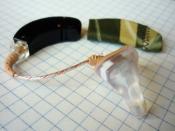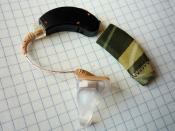Infant Hearing Impairment
Introduction
Ten fingers, ten toes, two eyes and a cute little nose; those are the important things parents look for when they first hold their baby. They see their precious bundle and marvel at its perfection. However, it isn't an easy arrival for a baby, who is poked and probed. It is all for the baby's benefit - to make sure that when the family goes home, the baby is given a clean bill of health. Until recently, medical staff checked almost everything and that seemed to be good enough. But it wasn't and it proved costly for many parents and their children. The baby's hearing wasn't tested (Valley Hospital and Medical Center web page). Infant hearing impairment is one of the most common major abnormalities present at birth. According to research done at Valley Hospital and Medical Center in Spokane, Washington, in the United States of America, up to three out of every thousand children are born with hearing loss.
Universal newborn hearing screening is quickly becoming standard in the medical field. Just as with other tests performed on newborns, hearing screening is becoming routine before a discharge from the hospital will be granted (A. Stredler - Brown, 1999). Studies indicate that without newborn testing, hearing loss can go undetected for almost two years. This could cause developmental delays, which place children at risk of life-long disadvantages. Because of the increase in newborn hearing screening, children are being identified as being deaf or hard of hearing earlier in life. This in turn allows early intervention services. The following paper will discuss these interventions. It will also address the development of receptive vocabulary in children who are hard of hearing.
It is thought that infants who are hard of hearing or deaf will still develop receptive...


